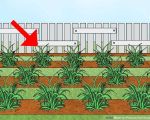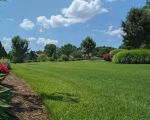Composting for Lawn Health: A Step-by-Step Guide
Composting is a natural and sustainable way to improve lawn health, providing essential nutrients to the soil while reducing waste. If you're looking to create a lush, green lawn, composting can play a vital role in ensuring your lawn's growth, resilience, and overall health. In this article, we’ll explore the benefits of composting for lawn health and provide a detailed guide on how to start composting, how to use compost effectively, and the positive impact it can have on your lawn.
1. Why Composting is Important for Lawn Health
Composting helps to create healthy soil, which is the foundation of a vibrant lawn. By using organic materials like grass clippings, leaves, and kitchen waste, composting breaks down these materials into rich humus that nourishes the soil. Here are a few reasons why composting is essential for maintaining a healthy lawn:
- Improves Soil Fertility: Compost provides essential nutrients, such as nitrogen, phosphorus, and potassium, which are crucial for grass growth and health.
- Enhances Soil Structure: The decomposed material in compost helps improve the soil structure, making it more porous, allowing water and air to reach grass roots more efficiently.
- Reduces the Need for Chemical Fertilizers: By adding compost, you naturally enrich the soil without the need for synthetic fertilizers, reducing environmental impact.
- Promotes Microbial Activity: Compost encourages the growth of beneficial microorganisms that help decompose organic material and enhance soil health.
2. How to Start Composting for Your Lawn
Starting a compost pile or bin for your lawn doesn’t have to be complicated. Here’s a simple, step-by-step guide on how to begin:
- Choose a Composting Site: Find a location for your compost bin or pile that’s easily accessible and gets a little sunlight. It should also have good drainage to prevent it from becoming too wet.
- Gather Compost Materials: Composting requires a balance of “green” (nitrogen-rich) and “brown” (carbon-rich) materials. Green materials include grass clippings, food scraps, and coffee grounds, while brown materials include dry leaves, straw, and cardboard. Aim for a 2:1 ratio of brown to green materials.
- Maintain the Pile: Turn the compost regularly to introduce air, which helps speed up decomposition. Keep the pile moist, but not too wet—think of the consistency of a wrung-out sponge.
- Wait for the Compost to Mature: Depending on conditions, compost can take anywhere from a few months to a year to fully decompose. It’s ready when it’s dark, crumbly, and has an earthy smell.
3. How to Apply Compost to Your Lawn
Once you’ve made your compost, it’s time to use it to improve your lawn. Here are a few methods for applying compost to your lawn:
- Topdressing: This is the process of spreading a thin layer of compost (about ¼ to ½ inch thick) over your lawn. Use a shovel, rake, or compost spreader to evenly distribute the compost, ensuring it reaches the soil and not just the grass blades.
- Incorporating into Soil: For newly established lawns, incorporate compost into the soil before planting. This is especially helpful for improving compacted or poor soil.
- Using Compost Tea: You can also make “compost tea” by soaking compost in water for a few days and then using it as a liquid fertilizer for your lawn. This method delivers nutrients quickly and helps promote microbial activity.
4. Tips for Effective Composting
Here are a few additional tips to help you maximize the benefits of composting for your lawn:
- Shred Large Materials: Break down larger materials like leaves, branches, and plant stems before adding them to the compost pile. Smaller pieces decompose faster and more evenly.
- Keep the Pile Aerated: Turning the compost regularly helps prevent it from becoming compacted and anaerobic, which can lead to unpleasant odors and slow decomposition.
- Monitor Moisture Levels: The ideal moisture level for compost is about 40-60%. If your compost is too dry, add water; if it’s too wet, add more brown materials like leaves or straw to balance it out.
- Know What to Avoid: Don’t add meat, dairy, oils, or diseased plants to your compost pile. These items can attract pests or introduce harmful bacteria to the compost.
5. Benefits of Organic Lawn Care with Composting
Using compost as part of an organic lawn care regimen offers numerous benefits for your yard and the environment:
- Enhanced Lawn Resilience: Compost helps build stronger, more resilient grass that’s less susceptible to disease, pests, and environmental stressors.
- Improved Water Retention: The organic matter in compost helps soil retain moisture, which is particularly beneficial during dry spells.
- Environmental Sustainability: By composting, you reduce waste and the need for chemical fertilizers, promoting sustainable practices in your lawn care routine.
- Better Soil Health: Regular composting improves soil structure over time, leading to a healthier, more fertile lawn that requires less effort and fewer chemicals to maintain.
6. Common Composting Mistakes to Avoid
Composting is easy once you get the hang of it, but there are a few common mistakes that beginners make. Here are some to watch out for:
- Not Balancing Green and Brown Materials: A common mistake is not achieving the right balance between green and brown materials. This can slow down decomposition and cause the compost to become too smelly.
- Adding Too Much Moisture: While compost needs moisture, too much water can lead to soggy piles that are slow to decompose and may smell bad.
- Ignoring Temperature: If your compost isn’t heating up, it might need more green materials or air. A warm pile decomposes faster and more efficiently.
7. When to Seek Professional Help
While composting is a relatively simple process, some homeowners may prefer to have professionals assist with lawn care. If you find that composting is not yielding the desired results or you have a large lawn that requires consistent care, consider consulting a lawn care expert. Lawn Care Services offers specialized composting and organic lawn care solutions to help you achieve the best results for your yard.
SEO Title: How to Prevent Lawn Diseases During Spring with Composting SEO Keywords: composting for lawn health, organic lawn care, compost benefits, lawn care tips, improve lawn health SEO Description: Discover the benefits of composting for lawn health. Learn how to use compost effectively to improve soil fertility and prevent diseases for a beautiful lawn.







